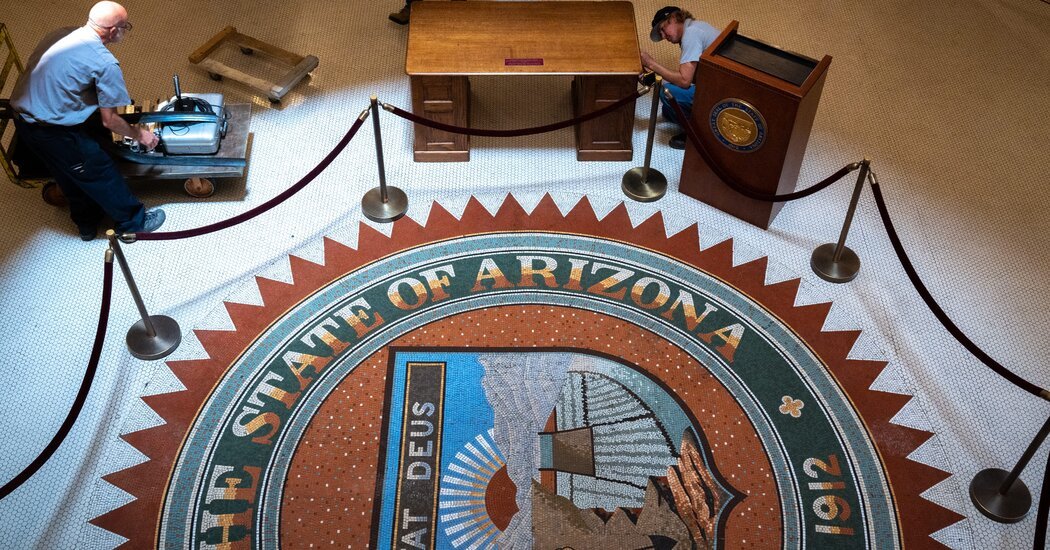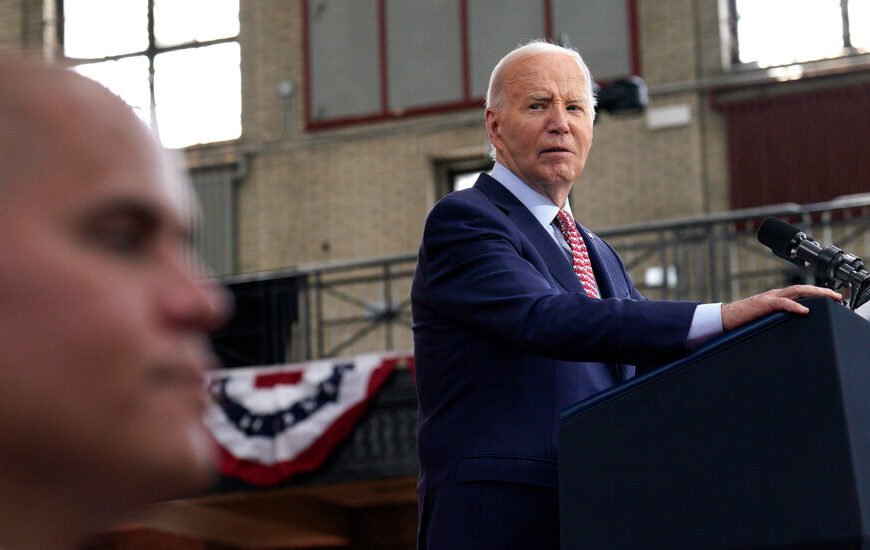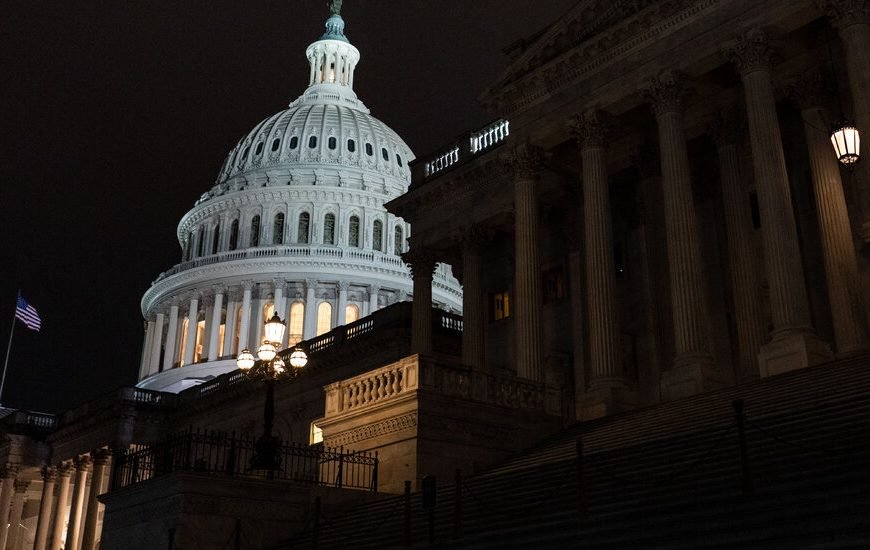Democrats in Arizona are eager for a fight over abortion access in the state, a political battleground where they’ll need every advantage to support President Biden and hang on to a key Senate seat.
But the battle lines have grown increasingly muddled amid a heated legal dispute over which Republican-backed restrictions will be on the books come November.
After the party ushered in a 15-week abortion ban in 2022 with almost no exceptions, with support from anti-abortion groups, some Republicans are now trying to get that law tossed. They instead favor an even more restrictive law dating to the 1800s that effectively bans the procedure entirely. And some Democrats, though they are strongly against both measures, are quietly acknowledging that a near-total ban could be a boon as they look to inspire voters to turn out.
Since the Supreme Court’s decision in the Dobbs case, overturning of Roe v. Wade and effectively returning the issue for states to decide, voters have come out in force to overwhelmingly back measures aimed at protecting abortion access, even in Republican-led states. And if the stricter ban is upheld, “there’s probably a benefit” for Democrats campaigning on abortion access, said Tresa Undem, a public opinion researcher who studies abortion.
“Certainly, if there’s a total ban, voters are going to be mobilized on this issue,” Ms. Undem said.
The unusual dynamic stems from various courts’ interpretations of Arizona’s 15-week ban, signed by former Gov. Doug Ducey a few months before the Dobbs ruling doing away with a constitutional right to abortion. Republicans and advocates of the 15-week ban had intended for the legislation to give way to restrictions enacted in 1864, when Arizona was still a territory.
That law, which mandates prison time for anyone who helps a woman obtain an abortion and does not include exceptions for rape or incest, went back into effect in Arizona shortly after Roe was overturned, when a district court judge said that it should take precedent over the 15-week ban. But an appeals court said months later that doctors could not be prosecuted under the territorial law, effectively allowing them to begin performing abortions again up to 15 weeks.
Now, attention shifts to the Arizona Supreme Court, which is set to issue a final ruling on the dueling abortion bans — likely by this summer — after anti-abortion groups appealed the lower court decision.
Democrats in Arizona are well aware of the political ramifications; a more restrictive law seems more likely to drive voters who are in favor of abortion access to the polls, which could propel Democrats into office. But few in the state are willing to openly acknowledge the political calculus, and Democrats emphasized that the real-life consequences of women losing access to abortion far outweighed any strategic judgments.
“Would it be easier to run on if there was a total abortion ban in Arizona? Sure, but that would be cataclysmically bad for the next nine months for the women of Arizona and that’s just not something that I want to see happen in any way, shape or form,” said Conor O’Callaghan, who is running in the Democratic primary to challenge Representative David Schweikert, a Republican from a district northeast of Phoenix.
Separately, abortion rights groups in Arizona are gathering signatures for a ballot measure that would enshrine abortion access until “fetal viability,” or about 24 weeks, in the state constitution, returning to the standard set by Roe v. Wade. The coalition, Arizona for Abortion Access, announced in January that it had already collected 250,000 signatures. The effort needs close to 400,000 by July to get on the ballot and put the question to voters this fall.
Opponents of the measure argue the proposed language is too broad and would “slash common-sense safety standards and precautions,” said Olivia Escovedo, a spokeswoman for It Goes Too Far, the campaign fighting the measure.
Advocates say they are confident that Arizonans would approve the measure if put to a vote. Dawn Penich, a spokeswoman for Arizona for Abortion Access, said she had heard from people who said that they wanted the government to stay out of their health care decisions.
“This is a human rights issue, this is a women’s rights issue,” Ms. Penich said. “In Arizona, people really value their freedoms and their autonomy.”
Arizona Democrats could see a benefit at ballot box because of the prominence of the abortion debate, said Christine Matthews, a national pollster who specializes in surveying female voters in swing states. But it may not be a silver bullet. When abortion access measures have appeared on the ballot in recent elections, the issue has drawn moderate and conservative voters to the polls in larger numbers, cutting across party lines.
“A total ban brings a much broader coalition out to reverse that, but those centrist to center-right to Republican voters may say, ‘A total ban is extreme, but that doesn’t mean I’m going to vote for Biden,’” Ms. Matthews said.
Either way, Democrats are leaning heavily into their support for abortion access, while Republicans try to pivot on the issue. Kari Lake, the Trump ally who ran for governor in 2022 and once called abortion the “ultimate sin,” is now against a federal abortion ban. In an interview with NBC News this month, Ms. Lake, who is running for Senate, praised the 15-week ban but also seemed to express openness to the proposed ballot measure’s abortion limit. (Ms. Lake’s opponent, Representative Ruben Gallego, a Democrat, has vowed to protect abortion access and hammered Ms. Lake repeatedly for her past comments.)
And Mr. Schweikert, who cosponsored a bill in Congress that would have amounted to a federal abortion ban, expressed support for in vitro fertilization treatments in February after an Alabama court ruled that frozen embryos should be legally considered children, imperiling the practice. Some feared that moving to restrict I.V.F., popular fertility treatment, would be a natural consequence of the Dobbs decision, but Republicans have largely been quick to stake out positions in favor of I.V.F.
Cathi Herrod, the president of the Center for Arizona Policy, a conservative lobbyist group that has backed both of Arizona’s abortion bans, said she expected voters would oppose widening access to abortion in the state in November.
“Once Arizonans learn the extreme nature of this amendment, Arizonans will reject it soundly,” Ms. Herrod said, adding that they will “see that it does not reflect their position on abortion.”
The abortion debate has also divided Arizona’s State Legislature, which Republicans control by razor-thin margins in both chambers.
Eva Burch, a Democratic state senator, put the abortion debate in searingly personal terms during a speech on the floor on Monday, detailing the barriers she faced when she tried to get an abortion for a recent pregnancy that she learned has no chance of survival.
“My medical provider was forced to tell me multiple things that don’t apply to my situation, and some that are just transparently factually false, and they do this because of laws passed by this Legislature, in opposition to medical testimony and advice,” Ms. Burch said. “From where I sat, the only reason I had to hear these things was in a cruel and really uninformed attempt by outside forces to shame and coerce and frighten me.”


















